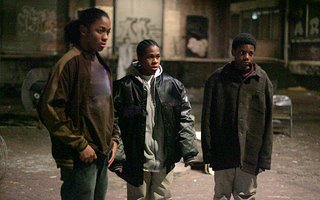
Unto Others
“It’s fascinating. I mean clinically speaking.” – Parenti
What a superb opening scene. Great pithy dialogue where the character’s body language really communicates what’s happening. The look on Omar’s face when he gets fitted with phone book armor and then the lick to his attacker’s ear – priceless. It’s scenes like this that no other TV show comes close to imitating and make “The Wire” so worth watching.
This season is billed as the season about education and what disparate factors lead to the education of youth today, but philosophically speaking, it seems to be about the merits of pragmatism versus idealism. Every group from City Hall to the middle school to the drug crews has a certain code and every group has those who successfully navigate their way through it with lies and half-lies and those who play it straight.
It’s like life is one big game, one big racket where everything operates in a certain system with rules that are tacit to its operation. These rules are in many ways irrespective of conventional morality and are thus rules that outsiders cannot understand. The successful player learns these rules, understands them, digests them and then spins them to his own advantage. All the big players, Marlo, Daniels, Omar, Rawls, Carcetti understand this. When Omar throws back the words that Bunk uttered to him last season, “A man got to have a code,” he could be talking to everybody.
Prez is probably the best example this season. He goes into teaching with the purest of intentions only to discover just how educationally unseasoned his students are and how dysfunctional the school system is. He learns that the by-the-book methods and straightforward learning that probably worked for him will not work with his students so he gets his probability lesson through with a game of dice. Like any good player, he finds out what he can get away with. You have to be infinitely resourceful in this world.
Juxtapose him with Cutty, the great idealist. In a world where everybody is trying to work the system, he’s the straight shooter, the one with the purest intentions and the greatest inability to compromise. You’re always rooting for him even if he lacks the necessary sophistication to massage people the right way and glide through the world.
He never quite understands why his kids desert him. He doesn’t know how to talk to Spider, who has quickly degenerated into the undisciplined street tough he was before he started to box. Cutty is at once the real hero of the show and also the one who seems most destined for some sort of failure of his own making.
And the project at Edward Tilghman got more interesting. Some great dialogue in those scenes. I especially liked it when the woman who moderates the class says, “Namond suffers from conduct disorders.” Bunny adds, “Yeah, he got a mouth on him.” But that’s the marriage that needs to happen for public policy to work, combining street knowledge with academic frames and tools. This plot angle is very exciting and I can’t wait to see how it plays out.
Now for some random observations:
- One little detail of notice this season. While slinging heroin has been a mainstay in all four seasons, this is the only one where the names of the products have been featured. It was “WMD” and “Pandemic” where Bodie’s crew was dealing. When Cutty confronts Spider, it’s “Brokeback” and “Darkhorse.” I don’t know about you but I don’t think “Brokeback” is a good branding choice in inner city Baltimore.
- The ex-Mayor telling Carcetti about the difficulties of being mayor and how “being a downtown lawyer and seeing my family every evening made for a fine life.” It mirrored something San Francisco Mayor Gavin Newsom said the other day. He was talking about whether he would run for re-election (a shoe in) and said that it wasn’t any kind of life to lead, “Ordering take-out every night and bringing work home with me, that’s not how I imagined my life at 37,” he said in my own paraphrase. An interesting anecdote to those pondering a political career of public service.
- I think it’s time for Bubbles to strap himself. The guy is amazingly resourceful about everything except for self-protection. Why not?
- Greggs is still an alleycat as they called her in Season One. I didn’t like it that they panned out when she entered the house with her gun drawn. Sometimes, the show cuts its scenes too close. It couldn’t of hurt to go in a bit more and see how she would have handled herself amidst all that.




